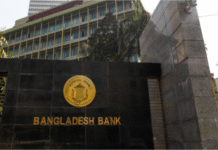
Private sector credit growth eased slightly to 7.50% in April 2025, down from 7.57% in March, according to the latest data released by the Bangladesh Bank.
This small decline comes after a notable rebound in March, when the rate had increased by 0.75 percentage points from February’s 6.82%, reaching its highest level in four months.
The rebound was largely driven by increased import demand ahead of Ramadan and the conversion of long-overdue foreign loans into local currency, categorised as forced loans.
As of the end of April, total outstanding credit to the private sector stood at Tk17.21 lakh crore, up from Tk 16.01 lakh crore a year earlier.
Bankers and central bank officials said the April slowdown was expected, following the seasonal spike in March linked to Ramadan-related imports. They noted that while demand remains relatively stable, several challenges continue to weigh on credit expansion.
“The demand for consumer goods remained steady after Ramadan, but there wasn’t the same surge in import-related financing that we saw in March,” a senior official from a private commercial bank told The Business Standard.
In the preceding months, credit growth had been on a downward trajectory: 7.15% in January, 7.28% in December, 7.66% in November, 8.3% in October, 9.2% in September, 9.86% in August, 10.13% in July, and 9.84% in June 2024.
This slowdown was worsened by political instability and disruptions in law and order following the change in government in August 2024.
The central bank’s latest quarterly report cautions that the banking sector continues to face structural challenges, including a sharp rise in non-performing loans (NPLs), sluggish credit disbursement, and capital shortfalls – all of which are hampering banks’ ability to issue new loans.
As of December 2024, NPLs had reached a record high of Tk3.45 lakh crore, a 21.33% increase from the previous quarter. This mounting pressure on banks is raising concerns about the stability and health of the financial system.
In its monetary policy for the second half of FY25, the Bangladesh Bank set a private sector credit growth target of 9.8% through July 2025.
However, with current growth trends falling well short of this target, achieving it may prove difficult unless business confidence improves and risks in the banking sector are addressed.
Officials from several banks’ credit departments said a new budget has been presented, and law and order have improved somewhat. At the same time, the country’s import and export sectors are showing good growth.
They expect private sector credit growth to rise in the coming months.
According to Bangladesh Bank data, during the first ten months of FY25, import LC openings and settlements rose by 11.45% and 21.97%, respectively, compared to the same period of the previous fiscal year.
In July-April of FY25, import LC openings stood at $58.94 billion, and settlements at $58.82 billion.
Moreover, according to data from the Export Promotion Bureau (EPB), after a slight slowdown in April, Bangladesh’s goods exports regained pace in May, logging an 11.45% growth compared to the same period in FY24.
The EPB data show that Bangladesh’s exports in May were $4.74 billion, up from $4.25 billion in May of the previous fiscal year.
Mohammad Ali, managing director and CEO of Pubali Bank, said, “We are still seeing consistent demand from consumers. Imports of essentials like edible oil, sugar, and pulses remain steady due to the size of our population and ongoing festivities.”
A managing director of a state-owned bank told TBS, “Investors are not investing afresh due to political instability. If the government can maintain law and order, new investments will begin.”
He added, “Many banks have sufficient liquidity. If the government reduces borrowing from banks to cover its budget deficit, banks will selectively invest in good customers. This will boost private sector investment and create new jobs.”

 Keep updated, follow The Business Standard’s Google news channel
Keep updated, follow The Business Standard’s Google news channel







